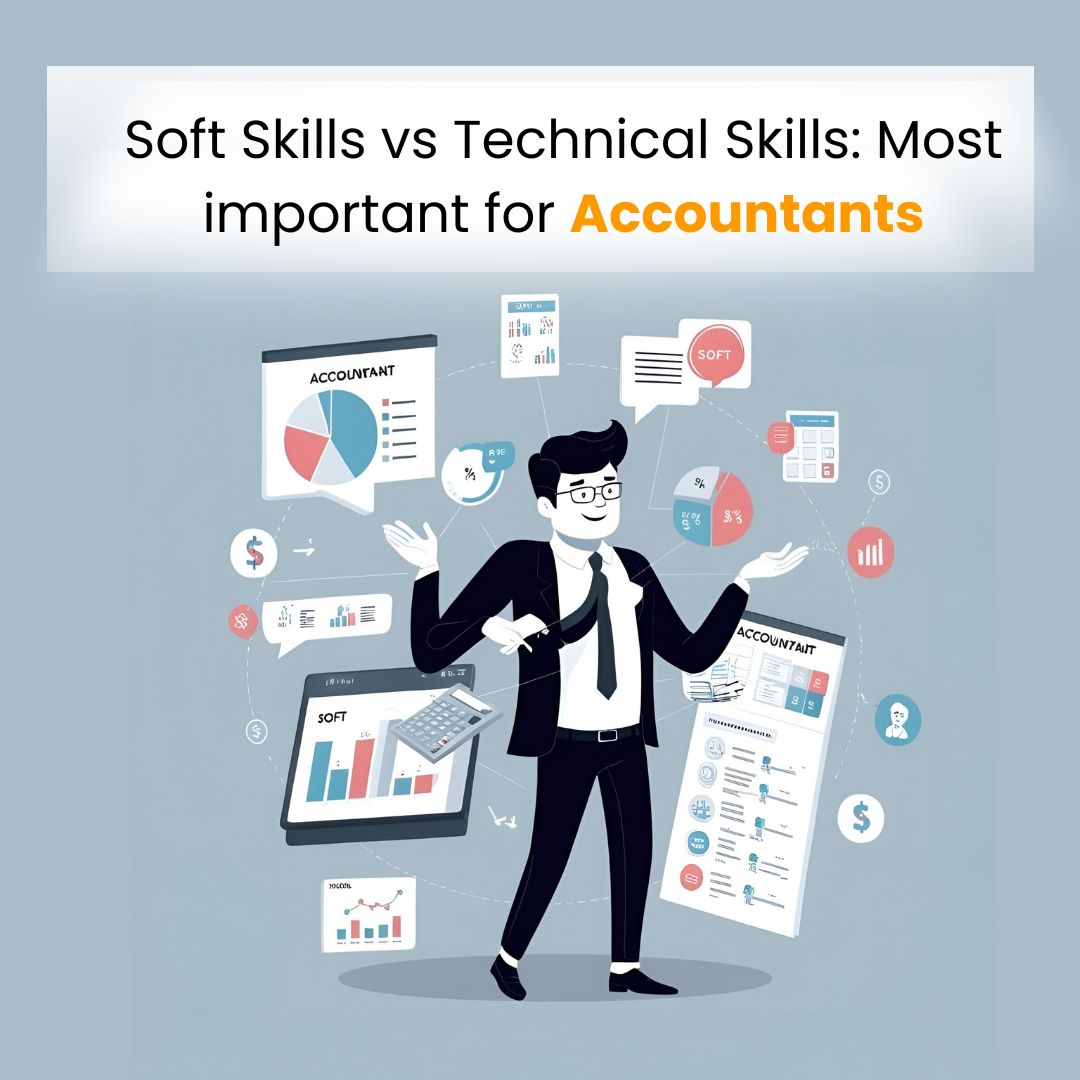Dull, boring, and occupied, that’s what you think of an accountant? Maybe someone who is embedded in numbers, staring at spreadsheets, or filing taxes in a boring office. But today, the accounting world is not so boring. With the rise in automation, international reporting standards, and data analytics, accounting has evolved. Now accounting has evolved into a dynamic forward career.
And both technical and soft skills are at the core of this progress. Thinking about what types of skills matter most, technical or soft skills, especially in a world where both are in demand. You are not alone. This blog will highlight the types of skills, technical and soft skills, and how they support the accounting careers of professionals. Which skills need to focus on, and it’s not just one. Let’s read!
Why Skills Matter for Accountants
Before knowing the details, let’s take a step back. Why should we even care about developing new skills?
To stay competent
The accounting field is changing continuously, from IFRS updates to automation. Automation tools like Power BI and Python are needed to stay competent. Moreover, staying up-to-date means moving ahead in accounting.
To avoid boredom
Repeating the same task daily can drain motivation. The only way to escape boredom while working is to learn new things. Learning new things builds curiosity and keeps one more engaged at work.
For delivering high-quality work
Anything you do in accounting, the quality of it depends on how skilled you are. Whether preparing for financial reports, presenting, or advising clients, skills are needed at every step.
For the satisfaction of learning curiosity
Many accountants have an analytical mind and the urge to learn and seek new things. Learning skills can satisfy the urge and enable one to adapt to new things.
Brushing up on the existing knowledge
Sills play an important part in brushing up on previous knowledge and concepts. Skills help in brushing up on the previous knowledge that will otherwise be lost with time. Skills assure that you will get long-term success.
Technical Skills for Accountants
Let’s start with the obvious technical skills are the big picture. They are the must-haves for every accountant. From the UK to Zimbabwe, every accountant needs to learn these technical skills. The following are the must-have technical skills for an accountant.
Accounting Standards and Principles
Understanding IFRS, GAAP, and other local accounting standards is non-negotiable. ACCA students, in particular, spend time getting to know those in the applied knowledge and applied skills stages.
Financial Reporting
It is difficult to prepare income statements, balance sheets, and cash flow statements accurately.
Taxation
From corporate tax to VAT, accountants must understand how taxation works and how to comply with local laws.
Auditing
Whether internal or external, having auditing skills helps you assess financial accuracy and compliance.
Data Analytics
Tools like Power BI, Excel, Python, and SQL are becoming essential in analyzing large financial datasets.
Budgeting and Forecasting
Being able to project financials and prepare budgets is a key part of financial planning.
ERP and Accounting Software
Familiarity with software like Sage, QuickBooks, Xero, or SAP can set you apart.

today!
Soft Skills for Accountants
Soft skills are not taught in textbooks, one can learn soft skills from experience and online learning. But they are essential for career growth, client satisfaction, and even personal happiness.
Networking
Accounting is not linked to the numbers only, but it’s a people game too. Networking helps students in learning and growth and opens doors to opportunities. Attending events like global ACCA events or joining LinkedIn groups, and building connections, is essential even for ACCA students in Zimbabwe or anywhere else.
Communication Skills
Communication is the key to verbal conversation or written communication with clients or colleagues. Great accountants make complex ideas easy to understand. Strong writing and speaking skills are important, especially for international or leadership roles.
Balancing work and life
Burnout is real. Jobs that require mental work daily can be energy-draining. Between long hours and deadlines, accountants need to master work-life balance. Mental health and setting boundaries should be a priority. It will improve your work performance and keep you happy at work.
Improved Learning
Learning never stops in accounting. New rules, tools, and techniques pop up all the time. Being a quick learner gives students an edge in passing exams and adapting to work.
Time Management
Deadlines rule the accounting world. Effective time management creates a smooth workflow. Use tools like Trello, calendars, or good old-fashioned to-do lists to stay on top of your game.
Leadership Skills
If you are someone who is managing a team or leading a project, leadership is an important soft skill. It means taking initiative, motivating others, and thinking with strategy. These kinds of traits elevate you from the rest of the accountants in the profession.
Learning to Say No
This might be surprising, but it’s a crucial skill. Saying no to tasks that overload you, go beyond your role, or compromise your values helps you stay focused and protect your mental well-being.
Conclusion
Now, the important thing to long-term fulfillment is getting to know both technical and soft skills. Learning skills become mandatory no matter if someone is a new ACCA qualifier, an experienced professional, or studying ACCA. It is the best way to invest in your career, keep learning, keep evolving, and remember that numbers may be the language of accountants, but people and progress are the soul.
Frequently Asked Questions
Why are soft skills important for an accountant?
Soft skills such as communication, time management, leadership, and networking help accountants collaborate, grow in their careers, and deliver high-quality work.
Are soft skills or technical skills more important?
Both soft and technical skills are important. Soft skills help in professional growth and catching good job opportunities while technical skills help in working tasks.
What are the trending skills in Zimbabwe that accountants can learn?
Emerging skills for accountants in Zimbabwe are data analytics (Power BI, Python). Sustainability accounting, leadership, and advanced modeling.
How can ACCA students improve their skills?
ACCA students can take an extra course in soft skills practice with case studies, use LinkedIn learning, attend workshops, and stay updated with real-world skills.

